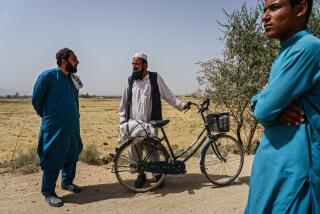Villagers Adapt Traditions for Afghan Election
- Share via
JALDAK, Afghanistan — Whenever the people of this village face an important question, whether they are arguing over a cow or voting for president, they turn to their elders for the answer.
So when the polls opened Saturday in the first presidential election in Afghan history, the minds of most voters in Jaldak already had been made up for them.
A month ago, when the election campaign was just starting, an 11-member shura, a traditional council, convened in the early morning and, after a three-hour discussion, agreed on fellow Pushtun Hamid Karzai, Afghanistan’s U.S.-backed interim president.
Then the shura sent out instructions to hundreds of people in this village 13 miles southwest of Qalat, capital of Zabol province, where U.S. and Afghan forces clash almost daily with Taliban insurgents and their allies. In rural areas across Afghanistan, similar councils of elders, from various ethnic groups, told their people how to vote.
Human rights workers say it was part of widespread intimidation that undermined Afghanistan’s first democratic election. To Haji Ramazan, head of the Jaldak shura, it was Afghans doing as they should -- following widely respected traditions.
“God says that if you want to decide anything, hold a shura first and then decide,” said Ramazan, 70. “Because if the shura decides, then the decision cannot be a failure. But if someone decides by himself, he will fail.”
As the cheery elder with a white, flowing beard and bright eyes magnified by thick glasses was speaking, the campaign manager for Karzai’s chief rival, Younis Qanooni, arrived.
Haji Mohammed Hashim, a burly former guerrilla fighter from the 1980s war against Soviet occupation, had come to lodge a formal complaint with the shura. The civility of their argument, over claims of irregularities that everyone expected, was proof that even a flawed election is progress in a country where political disputes often end with blood on the floor.
Hashim said many fellow Pushtuns wanted to vote for Qanooni, a former anti-Soviet guerrilla from the Tajik minority, but were harassed by local police and Afghan election officials at polling stations.
“As you know, many people around here are not well educated and they can’t read or write,” Hashim said. “They are mostly tire puncture repairmen and shopkeepers, and whenever they go to vote, they ask for instructions from election officials.
“And they say, ‘Check in front of Karzai’s picture [on the ballot], which is not good. Every person should vote independently and for whomever they want.”
Ramazan, the council leader, insisted that Hashim was wrong, and said there were no problems with the election.
“I haven’t seen anything like what you say,” Ramazan told Hashim, peering up at him. “I don’t know what you are talking about. No one has ever said something like this, that you should vote for Karzai -- not the district commissioner, not the workers in the voting station. I don’t believe this.”
“Then I am lying? With long beard?” Hashim asked, stroking his more luxuriant, black beard, speckled with gray. “Am I lying at this age?”
He turned to more than a dozen other Pushtun Qanooni supporters who had come to the small tearoom with him, and asked: “Is this an election? Does anybody agree with this kind of election?”
“No, no, no!” the men shouted. “This is not a fair election!”
Before the Jaldak shura decided to support Karzai, it had listened to a campaign pitch from a Qanooni supporter, but none of the 16 other presidential candidates sent a representative.
“No one else dared to come here,” said council elder Haji Dadullah, 65.
A couple of council members liked what they heard from Qanooni’s representative, an elderly former guerrilla commander with the Jamiat-i-Islami militia faction, but they were quickly overruled, Ramazan said.
And the decision of a shura is always final, Ramazan said, no matter how big or small the matter at hand.
“Two families could be fighting with each other, and if some of them kill one another, they come to the shura,” he said. “The shura decides the proper thing to do, and the shura solves their problems.
“Then we slaughter a cow and have a party.”
More to Read
Sign up for Essential California
The most important California stories and recommendations in your inbox every morning.
You may occasionally receive promotional content from the Los Angeles Times.













